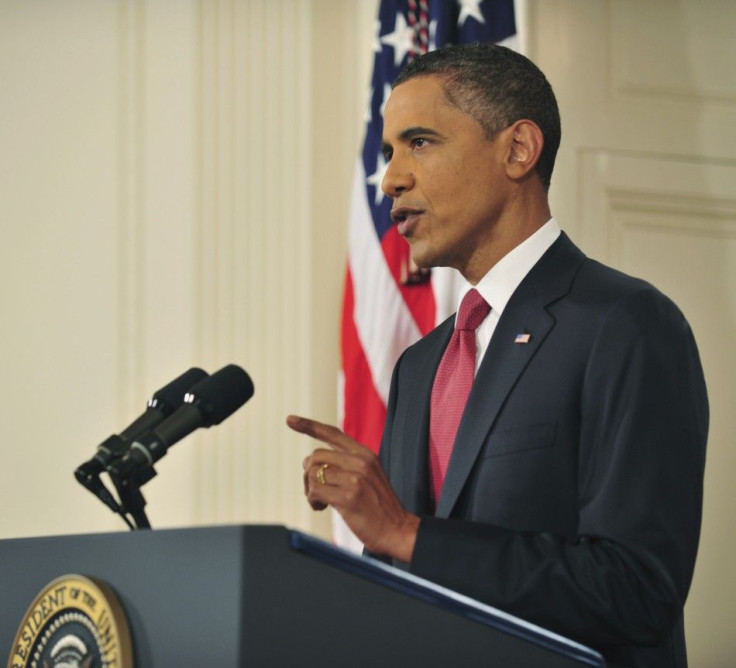Debt Deal Talks Enter Critical Stage

Analysis
The debt talks enter a critical stage Tuesday, and the compelling question remains: will the Democratic and Republican parties remain entrenched in stalemate-oriented position, or will the two take a step toward crisis resolution?
The pessimist would say the nation's two, major political parties are too polarized or dominated by ideological bases to resolve the conflict in time.
The optimist would argue that Monday's verbal jousts represent the apex -- or nadir -- of 'rhetoric for dollars' and now substantive talks can begin inside the beltway.
Of the two parties, House Speaker John Boehner, R-Ohio, appears to have the harder task. Boehner has to find a way to get at least a portion of the very conservative Tea Party faction to compromise, and work toward a deal that's in the interest of the nation.
Unfortunately, so far, the Tea Party, a small, but vocal faction, has not provided any signals that it's willing to compromise: it projects that it would rather let the U.S. Government default -- with all of its destructive consequence for credit markets and the U.S. and global economies -- than compromise with what they perceive to be a very liberal Democratic president.
Meanwhile, President Barack Obama, on the heels of an address to the nation Monday night, appears at this juncture to have an easier task encouraging his coalition to compromise.
In his Monday night address, Obama reiterated that the way to cut the budget deficit is to use a balanced approach -- involving both substantial cuts in spending and revenue increases -- not one that relies solely on cuts.
Obama also called on the Congress to raise the debt ceiling before the nation runs out of money and borrowing authority on Aug. 2, and he argued that a broad consensus exists in the Senate and partially in the House to achieve his balanced approach, but that a faction of Republicans in the House -- the Tea Party faction of the GOP -- was preventing it.
Obama added that a failure by Congress to raise the debt ceiling would trigger a "deep economic crisis."
The president then called on Americans to make their feelings known to their respective Congressman or Congresswoman, to help him break the gridlock in Washington.
Moreover, to say that time is of the essence regarding the negotations would be an understatement. The U.S. Congress has until the end of Aug. 2 to raise the U.S. debt ceiling to enable the government to pay its bills and service any debt due.
On Aug. 4, the U.S. Treasury Department is due to pay off $30 billion in maturing short-term debt. In theory, the United States could prioritize debt payments, but U.S. Treasury Secretary Timothy Geithner has warned lawmakers in Congress that the prioritization tactic would still cause investors to shun U.S. Treasury securities, commonly known as Treasuries.
Geithner has also repeatedly underscored that failing to raise the debt ceiling will have no constructive outcomes for the nation's fiscal condition, the task of deficit reduction, and U.S. and global stock and bond markets.
U.S. Federal Reserve Chairman Ben Bernanke has also said a failure to raise the debt ceiling would trigger a "huge financial calamity" that would send a "financial shockwave" throughout the global financial system.
A compelling question is, why hasn't Speaker Boehner been able to extract modest compromiss from the minority Tea Party faction of his party? The reason has to do with the GOP's base, which at this juncture, appears to be more-closely aligned with the very conservative Tea Party than with establishment Republicans, even though many are almost as conservative as Tea Party members.
In other words. Boehner knows he has only modest 'wiggle room' before a very conservative faction starts an action to remove him.
Political/Public Policy Analysis: T-minus 8 days, and counting, until the default deadline. Still, the view from here argues that the 'Sensible Senate' will create hybrid debt deal plan, something totaling about $2.5 billion in budget cuts with a comparable debt ceiling increase, with a 12-member, bipartisan commission appointed to identify additional cuts. The commission will have broad powers and be able to speed legislation to both chambers later this year.
Therefore, on a scale of 0 to 100 percent, the likelihood of a U.S. Government default remains at 25 percent on Tuesday morning, the same as it was Monday night.
© Copyright IBTimes 2025. All rights reserved.





















